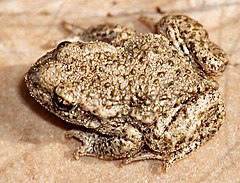Alytes
Wygląd
| Alytes[1] | |||
| Wagler, 1830[2] | |||
 Przedstawiciel rodzaju – pętówka babienica (A. obstetricans) | |||
| Systematyka | |||
| Domena | |||
|---|---|---|---|
| Królestwo | |||
| Typ | |||
| Podtyp | |||
| Gromada | |||
| Rząd | |||
| Rodzina | |||
| Rodzaj |
Alytes | ||
| Typ nomenklatoryczny | |||
|
Bufo obstetricans Laurenti, 1768 | |||
| Synonimy | |||
|
| |||
| Gatunki | |||
| |||
Alytes – rodzaj płazów bezogonowych z rodziny ropuszkowatych (Alytidae).
Zasięg występowania
[edytuj | edytuj kod]Rodzaj obejmuje gatunki występujące w Europie, z wyjątkiem jej północnej i wschodniej części, oraz w północno-zachodniej Afryce[6].
Systematyka
[edytuj | edytuj kod]Etymologia
[edytuj | edytuj kod]- Alytes: gr. αλυτος alutos „ciągły, mocny”[7].
- Obstetricans: łac. obstetrix, obstetricis „położna, akuszerka”[8]. Gatunek typowy: Bufo obstetricans Laurenti, 1768.
- Ammoryctis: gr. αμμος ammos „piasek”; ορυσσω orussō „kopać”[4]. Gatunek typowy: Alytes cisternasii Boscá, 1879.
- Baleaphryne: łac. Balearicus „Baleary”, od gr. Βαλιαρεις Baliareis „Baleary”; φρυνη phrunē, φρυνης phrunēs „ropucha”[5]. Gatunek typowy: Baleaphryne muletensis Sanchíz & Adrover, 1977.
Podział systematyczny
[edytuj | edytuj kod]Do rodzaju należą następujące gatunki[6]:
- Alytes almogavarii Arntzen & García-París, 1995
- Alytes cisternasii Boscá, 1879 – pętówka iberyjska
- Alytes dickhilleni Arntzen & García-París, 1995
- Alytes maurus Pasteur & Bons, 1962
- Alytes muletensis (Sanchíz & Adrover, 1979) – pętówka balearska[9]
- Alytes obstetricans (Laurenti, 1768) – pętówka babienica
Przypisy
[edytuj | edytuj kod]- ↑ Alytes, [w:] Integrated Taxonomic Information System (ang.).
- ↑ J.G. Wagler: Natürliches System der Amphibien, mit vorangehender Classification der Säugthiere und Vogel. Ein Beitrag zur vergleichenden Zoologie. München, Stuttgart und Tübingen: J. G. Cotta, 1830, s. 206. (niem.).
- ↑ A.L. Dugès: Recherches sur l’ostéologie et la myologie des batraciens à leurs différens âges; présentées à l’Académie royale des sciences, en réponse a la question suivante, "Déterminer, à l’aide d’observations, et démontrer, par des préparations anatomiques et des dessins exacts, les modifications que présentent, dans leur squelette et dans leurs muscles, les reptiles batraciens, tels que les grenouilles et les salamandres, en passant de l'état de larve à celui d’animal parfait," avec 20 planches. Paris: J.-B. Baillière, 1843, s. 7. (fr.).
- ↑ a b F. Lataste. Sur un nouveau genre de batracien anoure d’Europe. „Comptes Rendus Hebdomadaires des Séances de l’Académie des Sciences”. 88, s. 984, 1879. (fr.).
- ↑ a b F. Sanchíz & R. Adrover. Anfibios fosiles del Pleistoceno de Mallorca. „Doñana, Acta Vertebrata”. 4 (1–2), s. 6, 1979. (hiszp.).
- ↑ a b D. Frost: Alytes Wagler, 1830. [w:] Amphibian Species of the World 6.2, an Online Reference [on-line]. American Museum of Natural History. [dostęp 2024-07-21]. (ang.).
- ↑ Jaeger 1944 ↓, s. 13.
- ↑ Jaeger 1944 ↓, s. 150.
- ↑ B. Grabińska. Geografia płazów Europy na tle świata. „Zeszyty Instytutu Geografii i Przestrzennego Zagospodarowania”. 49, s. 27, 1997. (pol. • ang.).
Bibliografia
[edytuj | edytuj kod]- Edmund C. Jaeger, Source-book of biological names and terms, wyd. 1, Springfield: Charles C. Thomas, 1944, s. 1–256, OCLC 637083062 (ang.).